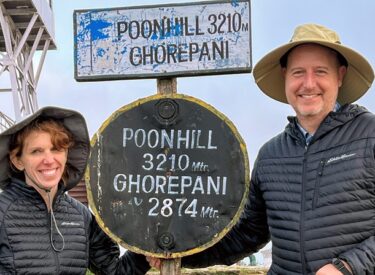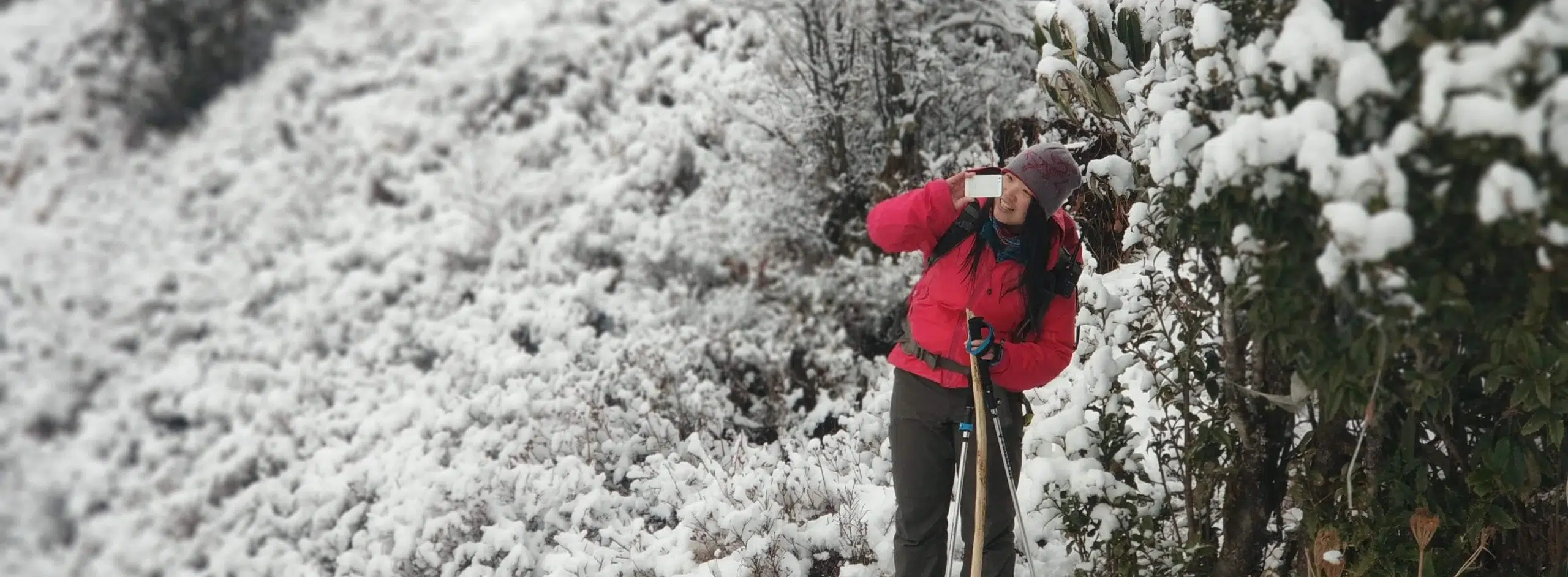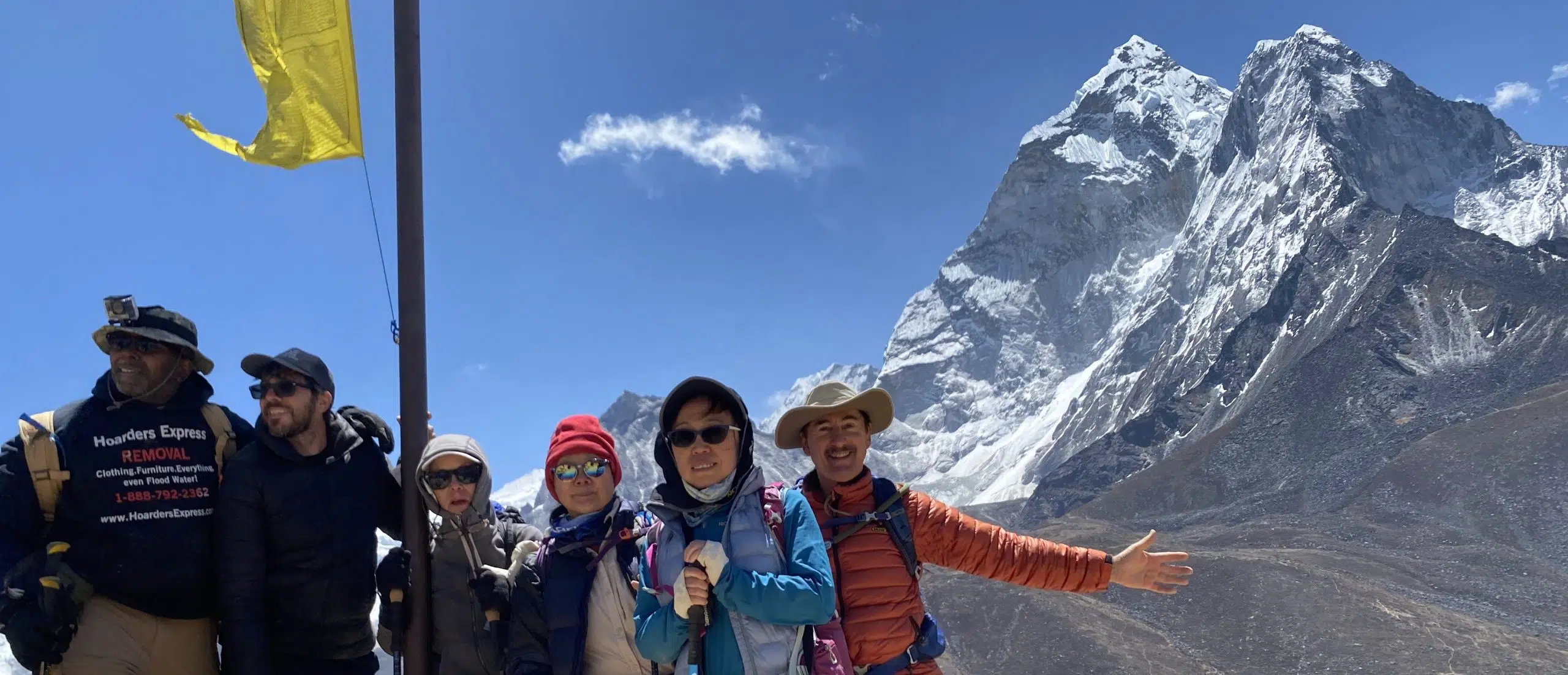Everest View Trek
based on 178 reviewsOverview of Everest View Trek
Experience the wonders of the Himalayas on the Everest View Trek, a captivating journey perfect for those seeking the beauty of Mount Everest without the rigorous demands of the longer treks. Known as the best short trek in the Everest region, this adventure offers an unparalleled blend of awe-inspiring mountain views, cultural richness, and serene spirituality.
The trek’s highlight is the Everest View Point, providing breathtaking panoramas of the world’s highest peak, making it an unmissable experience for every trekking enthusiast.
During this trek, immerse yourself in the tranquillity of the Tengboche Monastery, the spiritual heart of the Everest region. The journey takes you through the vibrant trails of Kathmandu, Lukla, and Namche Bazaar, culminating in a spectacular sunrise view from Tengboche, earning its fame as the Everest Sunrise Trek. Stay at the renowned Hotel Everest View, one of the highest-placed hotels in the world, where luxury meets the wilderness.
Perfect for both seasoned trekkers and beginners, the Everest View Trek is a shorter alternative that doesn’t compromise on the authentic Himalayan experience. With every step, this trek unveils the enchanting beauty of Nepal, making it an unforgettable adventure in the heart of the Everest region. Book your journey now and enter a world where nature’s majesty reigns supreme.
Itinerary of Everest View Trek
Welcome to Nepal, the starting point of your exhilarating Everest View Trek! As you disembark at Tribhuvan International Airport in Kathmandu, you’re immediately greeted by the vibrant energy that Nepal is known for.
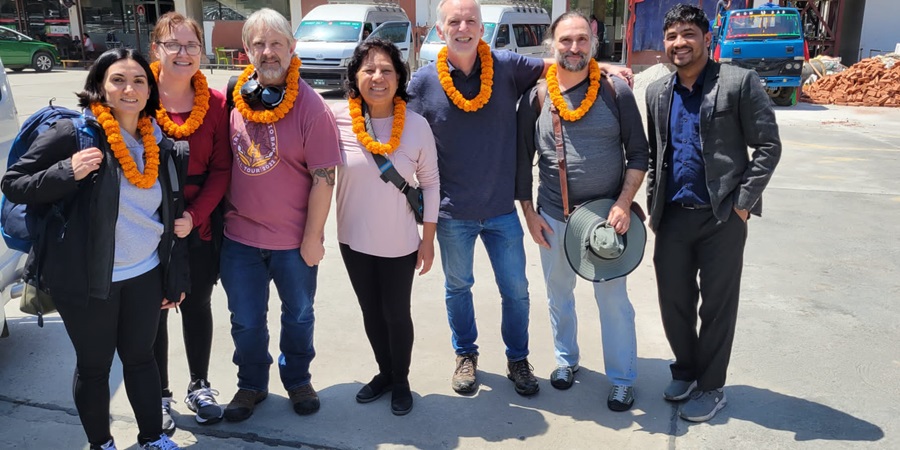
Our welcoming team will guide you from the airport to your hotel, ensuring a smooth start to your Everest trek.
Once you’ve settled in, take the opportunity to explore Thamel. This bustling district is the heart of Kathmandu and a central hub for trekkers embarking on various Everest treks, including the Everest Panorama Trek and the shorter Everest Tengboche Trek.
In Thamel, you can immerse yourself in the lively Nepalese culture, find any last-minute gear for your trek, or relax and acclimatize in preparation for your adventure.
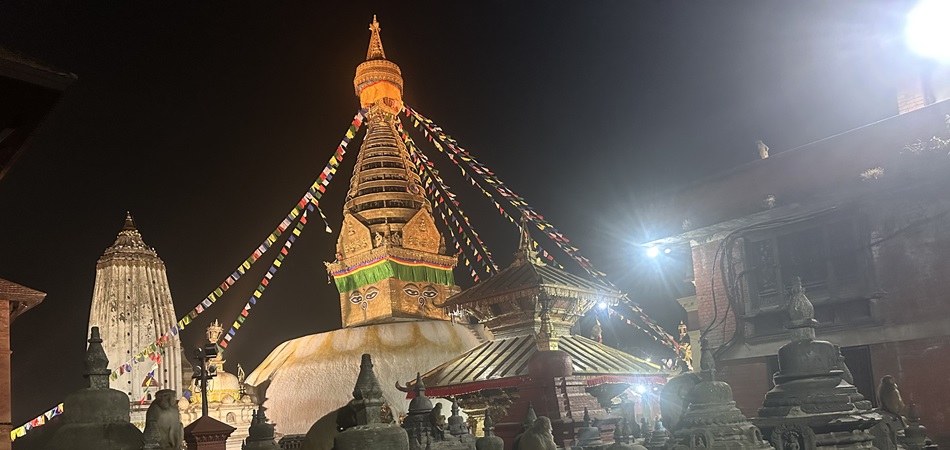
This initial day in Kathmandu is crucial, especially for those embarking on the Everest View Trek. It provides a gentle introduction to Nepal and allows you to acclimatize, which is essential for a successful trekking experience.
Whether you’re here for a short Everest trek or the more extensive Everest Tengboche Trek, this day in Kathmandu is an integral part of your journey.
Today is all about preparing for your upcoming Everest View Trek. This day is crucial for ensuring you have everything for your journey, whether the shorter Everest Panorama Trek or the more extensive Everest Tengboche Trek.
First on the agenda is finalizing all necessary trekking permits. These are essential for your Everest trek, allowing you to explore this magnificent region legally and safely. Our team is on hand to assist you with all the paperwork, making the process smooth and hassle-free.
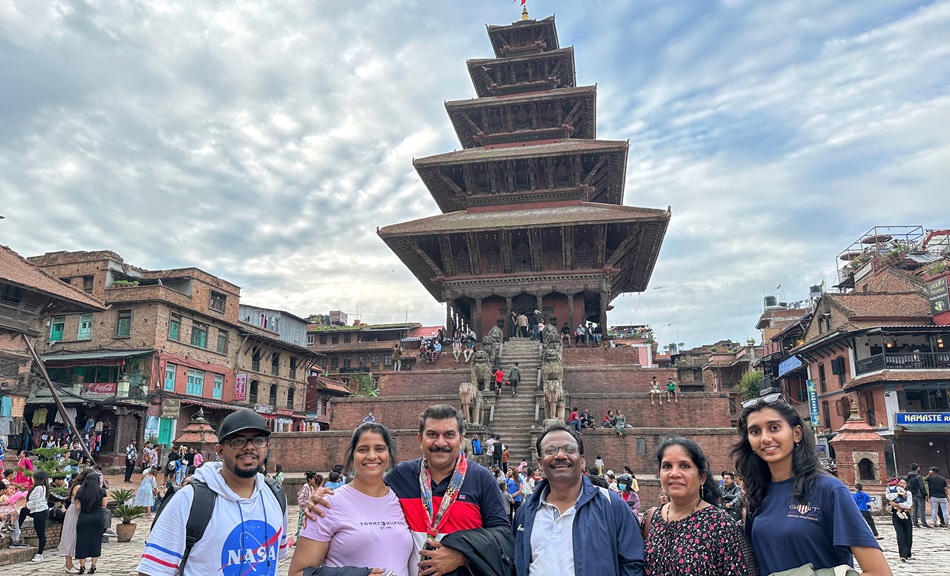
Next, it’s time to double-check your trekking gear. For the Everest View Trek, having the right equipment is vital. Whether you’re embarking on a short Everest trek or the extended Everest Tengboche Trek, having proper gear will significantly enhance your trekking experience.
Our expert guides will help you review your gear, ensuring you’re well-prepared for the journey ahead.
We also have organized a detailed trek briefing. This session is vital to your preparation, as it covers essential information about the Everest trek route, safety measures, and what to expect during your journey. Understanding these details is crucial, especially for those embarking on the Everest Panorama Trek or the Everest Tengboche Trek.
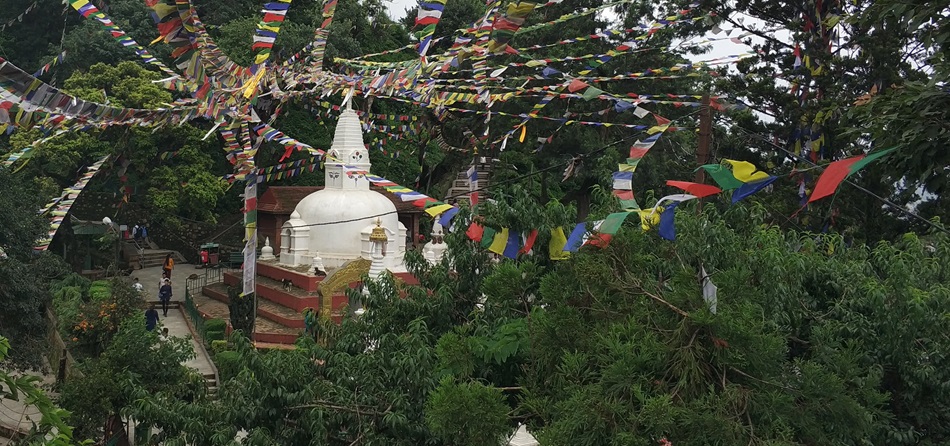
In the afternoon, immerse yourself in the cultural richness of Kathmandu with a guided tour of the city’s famous sights. A visit to the historic Swayambhunath Stupa is a must.
This iconic site, also known as the Monkey Temple, offers a spiritual experience and panoramic views of Kathmandu, making it a perfect addition to your Everest View Trek experience.
Another critical destination is Kathmandu’s Durbar Square. Exploring this UNESCO World Heritage Site will give you insight into Nepal’s rich history and culture, an excellent complement to your trekking adventure.

Whether you’re here for a short Everest trek or the more extensive Everest Tengboche Trek, these cultural experiences add depth to your journey.
Today’s preparation and exploration set the perfect tone for your Everest View Trek. It’s a day to ensure you’re fully equipped and mentally prepared for the exciting days ahead in the breathtaking Everest region.
Today marks the exhilarating start of your Everest View Trek adventure! Rise early for a breathtaking morning flight to Lukla, the renowned gateway to the Everest region.
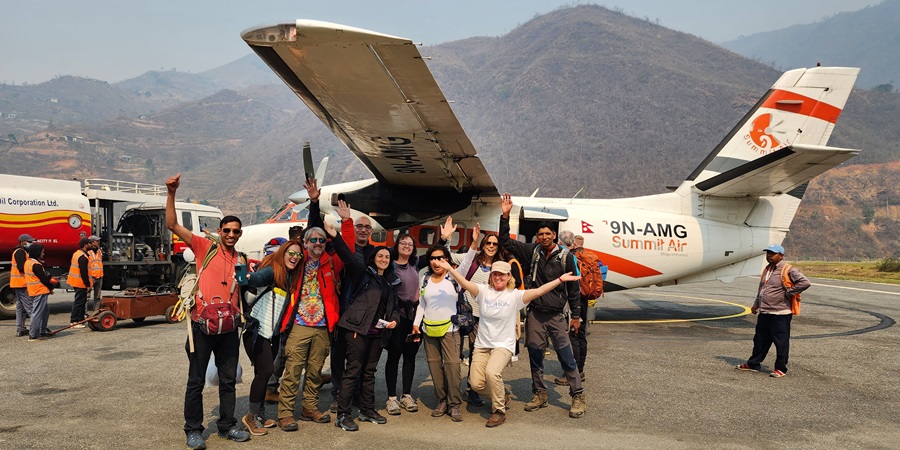
This flight is more than just a transfer; it’s an integral part of your Everest trek experience. As you ascend, the flight offers unparalleled, awe-inspiring views of the Himalayas, a perfect prelude to your trekking journey.
Landing in Lukla is an experience in itself. At an altitude of 2,860 meters, Lukla is the starting point for many treks in the Everest region, including the Everest Panorama Trek and the Everest Tengboche Trek. The air is filled with excitement and anticipation, shared by trekkers ready to embark on their Everest adventures.
From Lukla, you will begin your trek to Phakding, a moderate and enjoyable journey that takes about 3-4 hours. This leg of the trek is a significant part of the Everest View Trek, offering a gentle introduction to the trails and landscapes of the region.
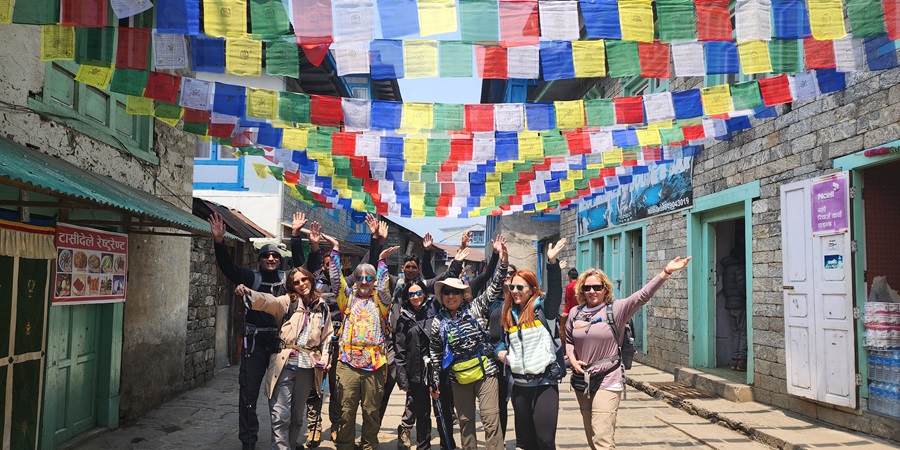
Trekking towards Phakding, you’ll follow the Dudh Kosi River, surrounded by the natural splendour of the Himalayas, which is a hallmark of both the short Everest trek and the more extensive Everest Tengboche Trek.
This initial trekking day is thoughtfully planned to be relatively easy, allowing you to acclimatize gradually to the altitude and environment. It’s essential to any Everest trek, ensuring your journey is comfortable and enjoyable.
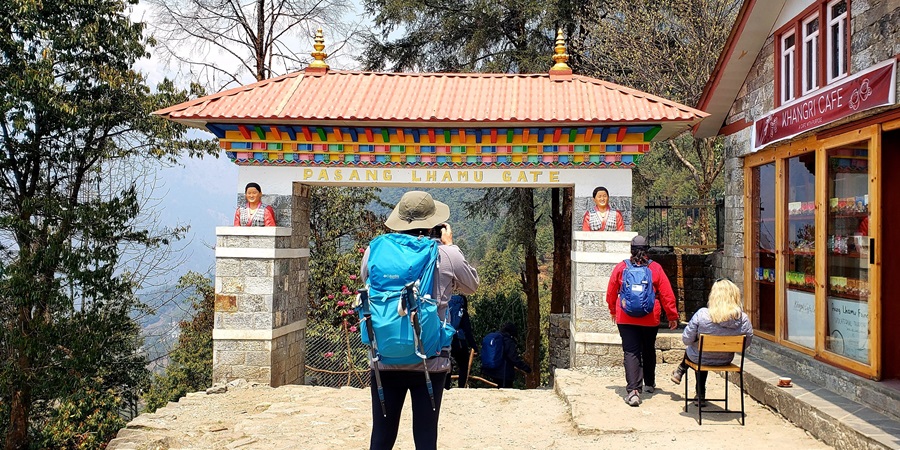
As you progress towards Phakding, immerse yourself in the stunning surroundings. The path is lined with traditional Sherpa villages, colourful prayer flags, and wheels, which are culturally enriching and uniquely charming the Everest View Trek.
Today, part of your Everest View Trek will lead you to the vibrant and bustling Namche Bazaar, often hailed as the Gateway to Everest. This leg of your trek is a significant part of the Everest Tengboche Trek and a pivotal point in any Everest trek, filled with breathtaking natural scenery and cultural discoveries.
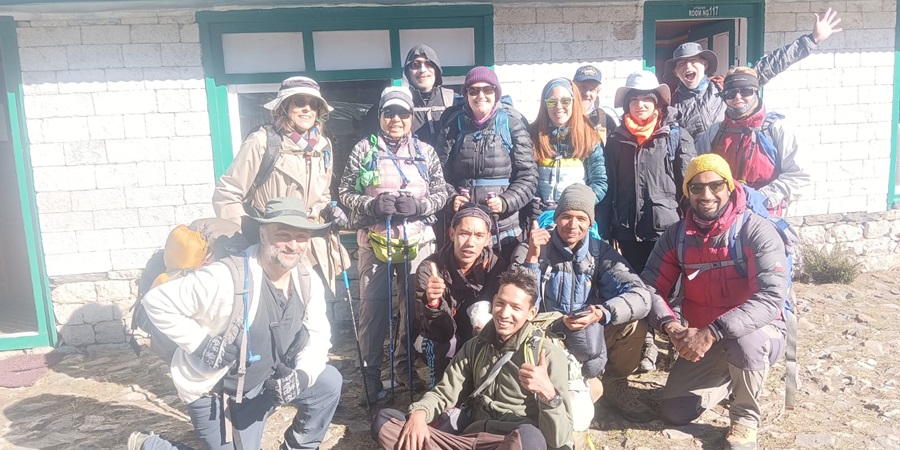
As you trek towards Namche Bazaar, the path meanders alongside the enchanting Dudh Kosi River. This route, integral to the Everest Panorama Trek and the short Everest trek, is lined with lush pine forests and offers potential glimpses of the majestic Mount Everest on clear days. The journey to Namche is a visual feast, showcasing the diverse beauty of the Himalayan landscape.
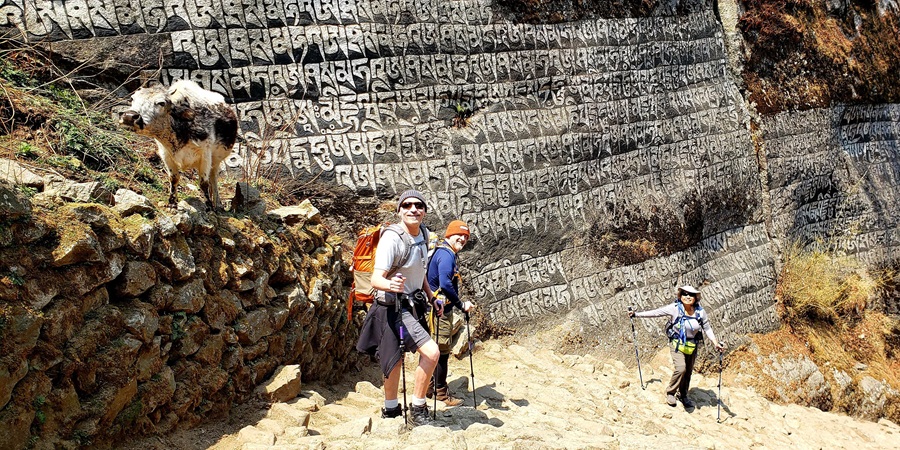
Namche Bazaar, perched at an altitude of 3,440 meters, is a lively hub in the Everest region. It’s more than just a stopover; it’s a cultural heartland for trekkers and climbers.
For those on the Everest Tengboche Trek or any other Everest trek, Namche offers a unique opportunity to immerse in Sherpa culture, with its vibrant market and local eateries, warmly welcoming all trekkers.
The trek to Namche is strategically planned to aid in acclimatizing to the higher elevations, a crucial aspect of any successful Everest View Trek. The gradual ascent allows your body to adjust to the altitude, ensuring a more comfortable and enjoyable experience as you progress deeper into the Everest region.
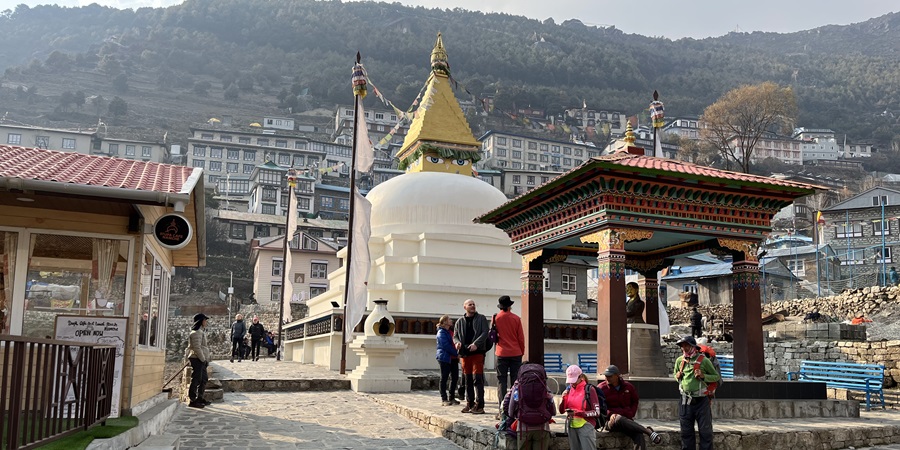
In conclusion, your trek to Namche Bazaar on the Everest View Trek is more than just a hike; it’s an adventure filled with awe-inspiring natural landscapes and rich cultural interactions.
Reaching Namche Bazaar is a significant milestone in your Everest trek, offering a blend of Sherpa culture, stunning views, and a taste of what the majestic Everest region provides. Embrace this unique experience as you step closer to the heart of the Himalayas.
Today’s leg of your Everest View Trek is not just a trek but a spiritual and scenic journey to Tengboche, a place of profound significance in the Khumbu region.
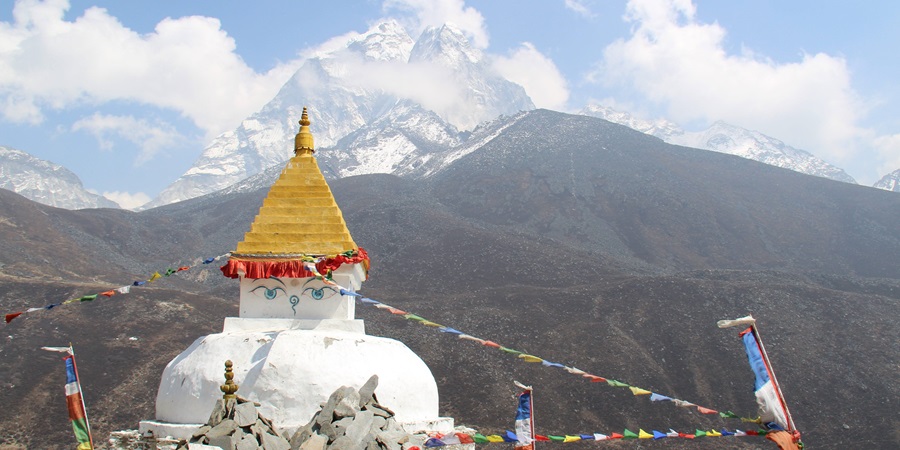
This stage is a crucial part of the Everest Tengboche Trek and an enriching experience for anyone on the Everest Panorama Trek or undertaking a short Everest trek.
The trek to Tengboche is moderately challenging, offering a blend of natural beauty and cultural richness. As you embark on this approximately 5-hour journey, you’re treated to some of the most stunning landscapes in the Everest region.
The trail winds through lush forests and across suspension bridges, with the majestic Himalayas as a constant backdrop.
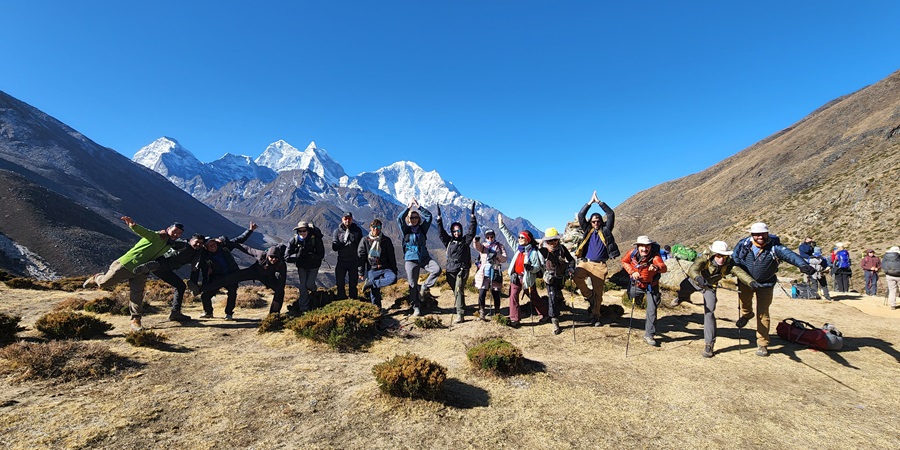
Tengboche is a serene and picturesque village renowned for housing the largest Buddhist monastery in the Khumbu region – the Tengboche Monastery. This monastery is not just a religious site; it’s a spiritual heart for the Sherpa community and trekkers on the Everest View Trek.
The Tengboche Monastery symbolises peace and spirituality and is surrounded by incredible mountain vistas, including views of Mount Everest, Ama Dablam, and Lhotse.
If time permits, visiting the Tengboche Monastery is highly recommended. This visit offers a unique opportunity to observe and participate in Buddhist rituals and to gain a deeper understanding of the local culture and spirituality.

It’s a profound experience that adds a significant dimension to your Everest trek, whether on a short or extended Everest Tengboche Trek.
Your trek to Tengboche is a journey transcending physical trekking. It’s an opportunity to connect with the spiritual essence of the Himalayas while enjoying some of the most breathtaking scenery in the region.
Reaching Tengboche is a highlight of the Everest View Trek, enriching your experience with its spiritual significance and stunning natural beauty. This day promises to be a memorable part of your journey through the Everest region.
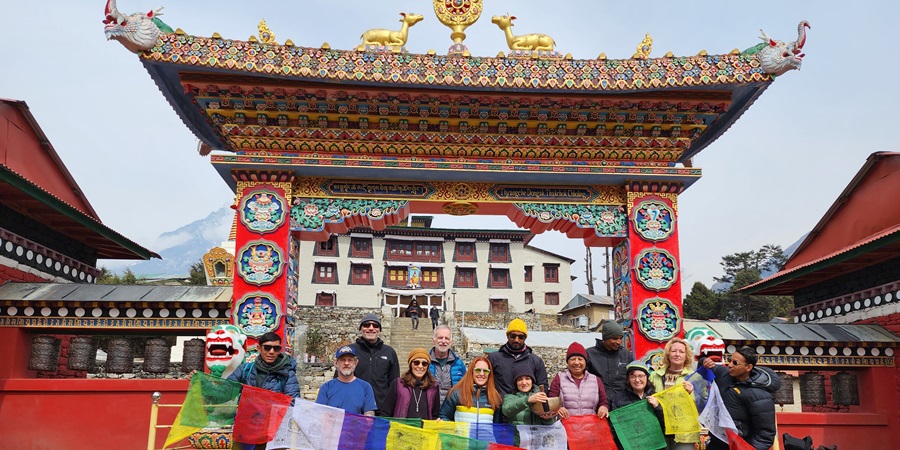
Today, as part of your Everest View Trek, you’ll be saying a fond farewell to the majestic mountains, retracing your steps back to the lively Sherpa town of Namche Bazaar.
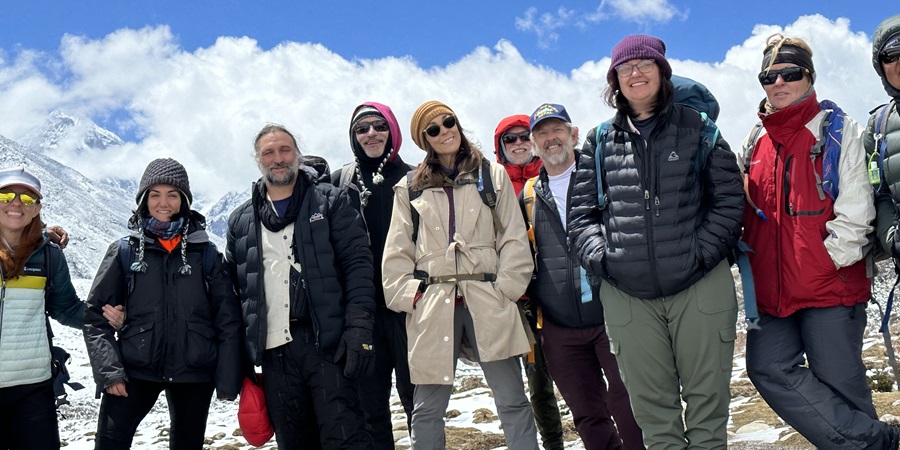
This part of your journey, significant in both the Everest Tengboche Trek and the Everest Panorama Trek, is a time for reflection and savouring the last moments of your Himalayan adventure.
The trek back to Namche is a chance to revisit the stunning landscapes you encountered on your way up. Walking the same trails, you’ll see the beauty of the Everest region from a new perspective, appreciating nuances you may have missed before.
This return trek is a part of every Everest adventure, whether a short Everest trek or a more extended expedition, and it offers a unique blend of physical challenge and natural beauty.
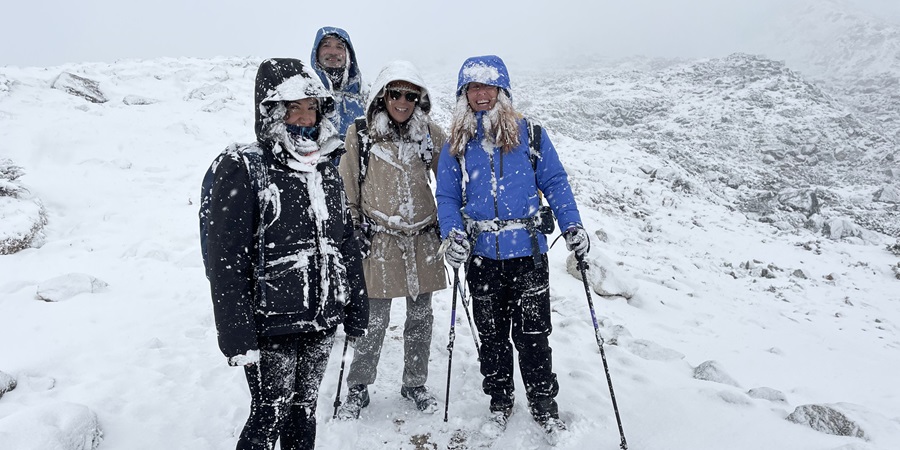
Upon reaching Namche Bazaar, you can relax and unwind. This bustling Sherpa town, a central hub for trekkers, offers a variety of cafes where you can enjoy a nice cup of coffee, reflecting on the experiences and achievements of your trek.
Namche Bazaar also provides ample opportunities for souvenir shopping. Here, you’ll find a range of local handicrafts, traditional Sherpa items, and trekking memorabilia, perfect for bringing a piece of the Everest region home.
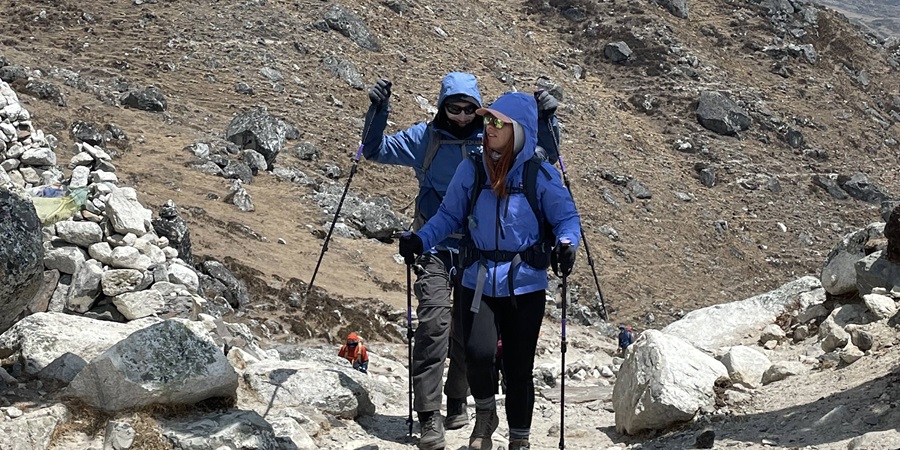
This day is more than just a trek; it’s an opportunity to soak every last bit of the Everest region’s charm. Namche Bazaar’s vibrant atmosphere and friendly locals provide a warm and welcoming environment in which to relax and reminisce about your journey.
In summary, your return to Namche Bazaar on the Everest View Trek is a bittersweet farewell to the mountains and a celebration of your journey.
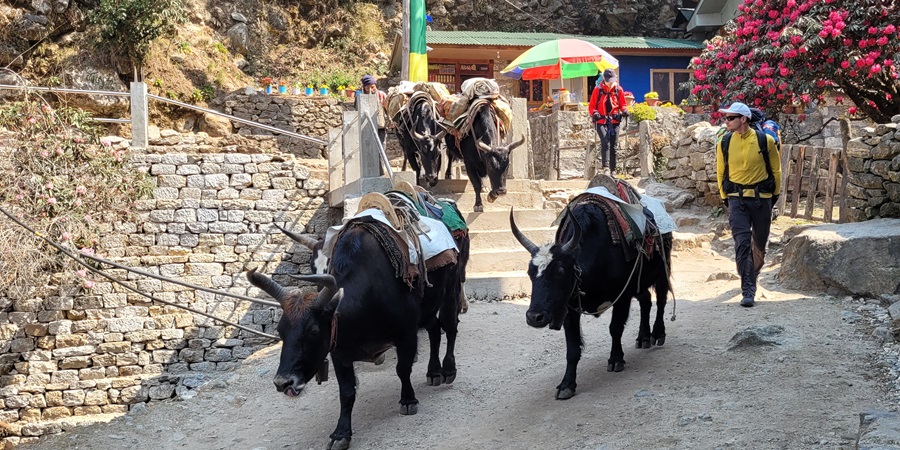
Whether you embark on the Everest Tengboche Trek or a shorter Everest trek, today is a day to cherish the memories made and look forward to future adventures. Enjoy the comforts of Namche Bazaar as you prepare for the next leg of your journey back to Kathmandu.
As you embark on the final day of your Everest View Trek, you’ll be trekking back to Lukla, symbolically marking the conclusion of your extraordinary journey in the mountains.
This day is a pivotal part of the Everest Tengboche Trek and a significant moment for anyone who has traversed the paths of the Everest Panorama Trek or embarked on a short Everest trek.
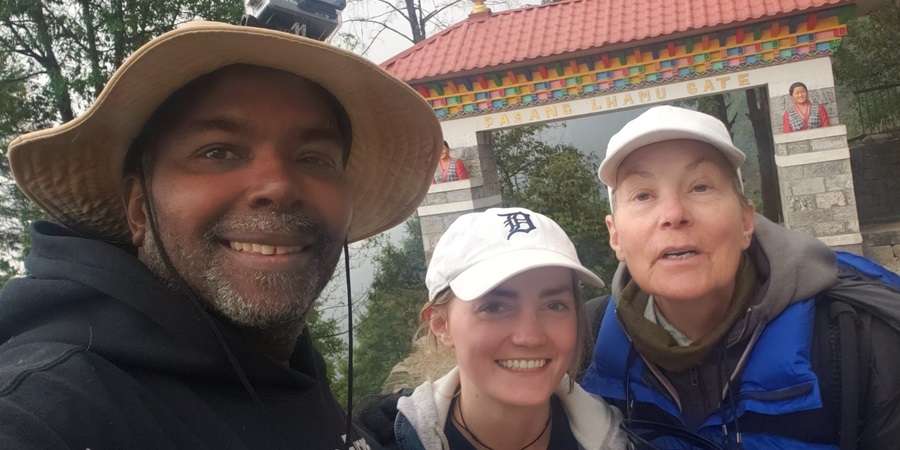
The trek from Namche Bazaar to Lukla is an opportunity to reflect on your journey’s awe-inspiring experiences and accomplishments.
As you retrace the paths walked earlier, each step brings back memories of the stunning vistas, the unique Sherpa culture, and the personal challenges you’ve overcome. This route, familiar yet new with the perspective gained, allows you to soak in the beauty of the Everest region one last time.
Reaching Lukla signals the end of your trekking adventure and serves as a moment to celebrate your journey. Whether it was your first time on an Everest trek or another chapter in your trekking experiences, reaching Lukla is a testament to your spirit of adventure and love for the natural world.
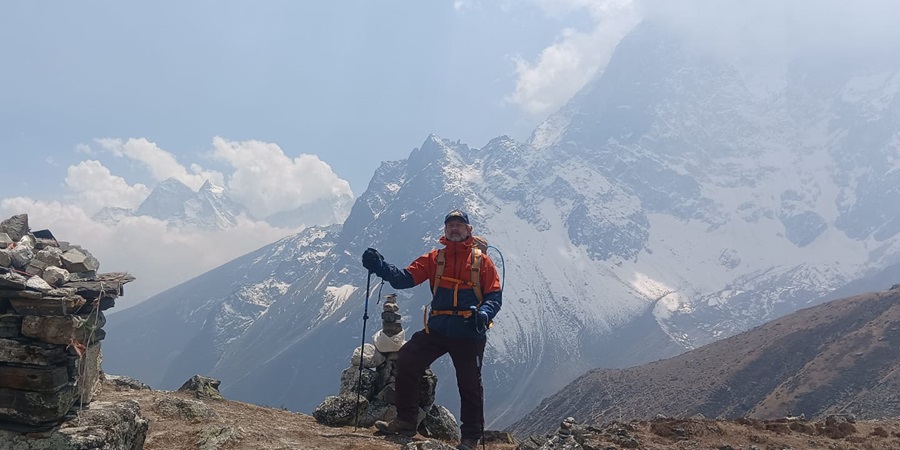
The trek back to Lukla is more than just a physical journey; it’s a time for introspection and gratitude. The paths of the Everest region, from the bustling streets of Namche Bazaar to the serene trails of Tengboche, have provided a backdrop to a journey that is as much about internal discovery as it is about exploring external landscapes.
In summary, today’s trek back to Lukla is the last leg of your Everest View Trek, a significant milestone that encapsulates the essence of your journey. Whether you embark on the Everest Tengboche Trek, the Everest Panorama Trek, or a shorter Everest trek, this final day is a time for reflection and appreciation.
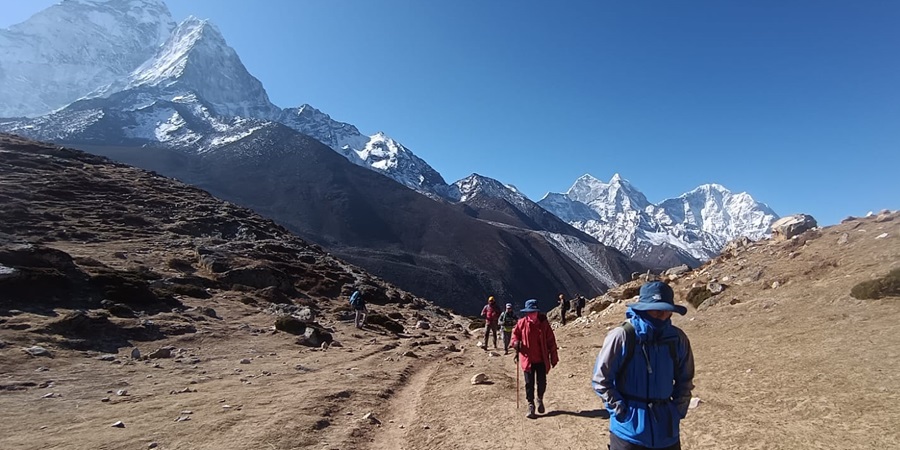
As you trek back to Lukla, embrace the memories and experiences you gained, knowing that your journey in the Everest region has been remarkable.
Following your transformative journey on the Everest View Trek, today begins with an early breakfast in Lukla before you take your flight back to Kathmandu.
This return flight is not just a simple transition from the Everest region; it’s a bridge between the serene landscapes of your trek, including experiences from the Everest Panorama Trek and Everest Tengboche Trek, and the vibrant energy of Nepal’s capital.
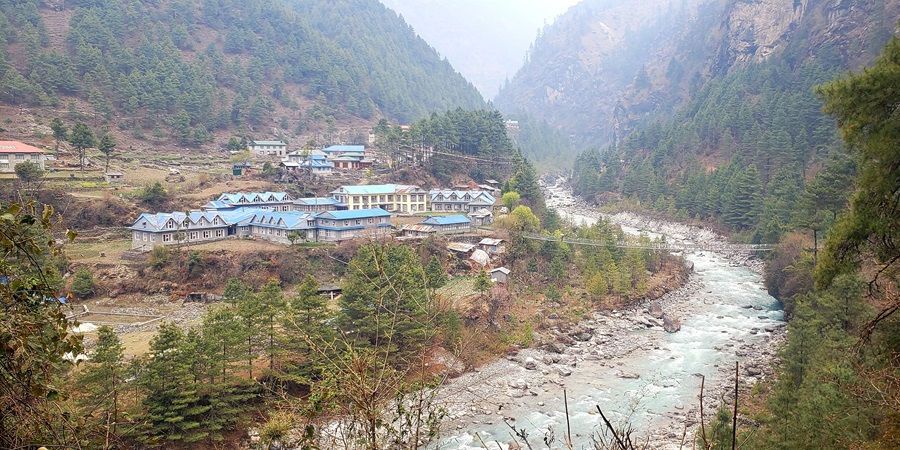
As you soar back to Kathmandu, you’ll carry memories of the awe-inspiring vistas and enriching cultural experiences from your time in the Himalayas, whether a short Everest trek or a more extended expedition.
The flight offers one last aerial view of the mountainous terrain, a fitting farewell to the peaks and valleys that have been your home during this adventure.
Once back in Kathmandu, the rest of your day is yours to enjoy leisurely. This is a perfect opportunity to delve deeper into the city’s rich heritage. You might explore more of Kathmandu’s renowned landmarks, perhaps visiting sites you missed before your trek.
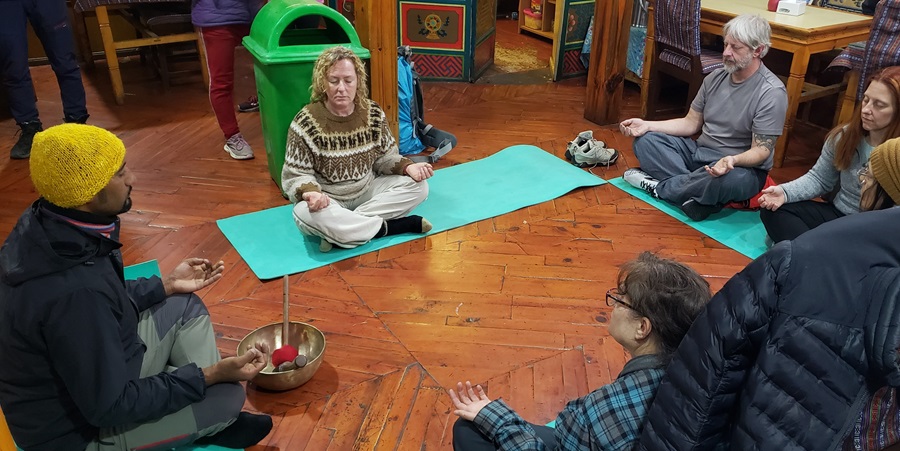
Places like Pashupatinath Temple, Boudhanath Stupa, and the Garden of Dreams offer peaceful and reflective environments in which to continue your journey of discovery in Nepal.
Alternatively, you might engage in some last-minute shopping in Kathmandu. The city’s markets and local shops are brimming with handicrafts, traditional Nepalese clothing, and unique souvenirs — ideal for bringing a piece of Nepal home.
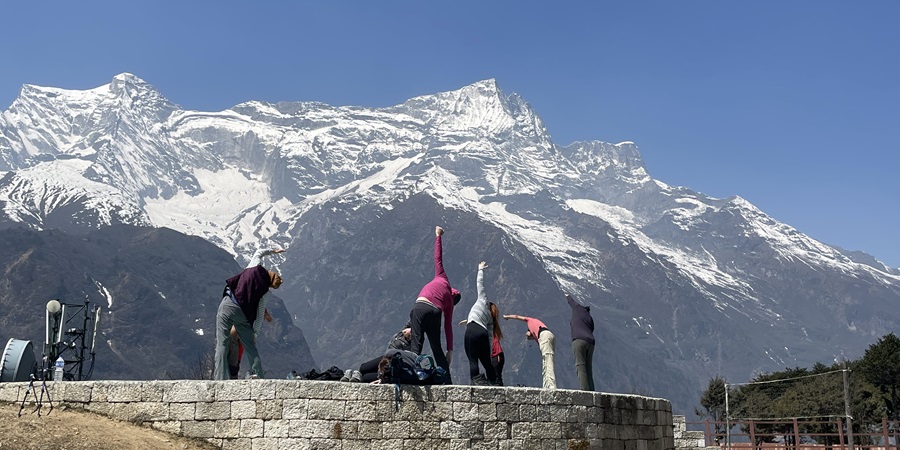
It’s also an excellent chance to savour more local cuisine, trying dishes and flavours not yet experienced during your stay.
In summary, your return to Kathmandu marks the conclusion of your Everest View Trek. Whether your journey took you on the Everest Tengboche Trek, the Everest Panorama Trek, or a shorter version of the Everest trek, this day in Kathmandu allows you to transition gently back to urban life while reflecting on the incredible experiences you’ve had in the Himalayas.
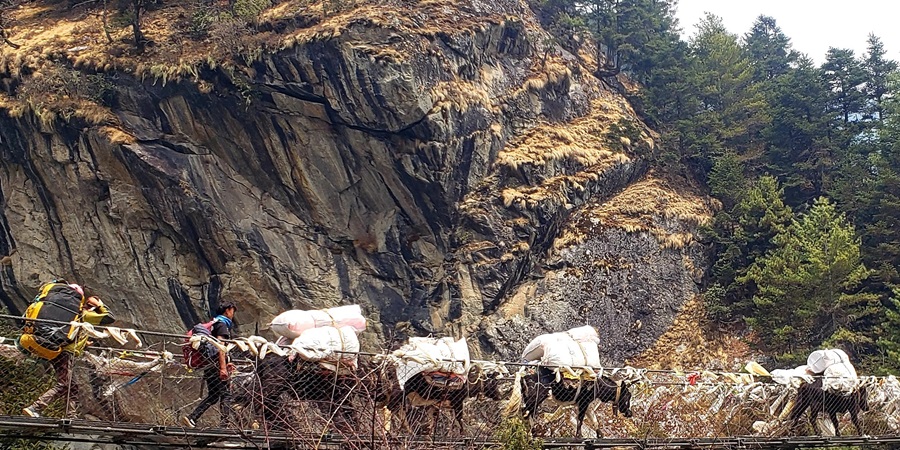
Embrace this time to relax, explore, and enjoy the diverse offerings of Kathmandu, a city that’s as much a part of your journey as the trails you’ve trekked.
As your unforgettable journey on the Everest View Trek ends, it’s time to bid farewell to Nepal’s stunning landscapes and rich culture.
Depending on your flight schedule, our dedicated team will ensure a smooth departure, escorting you to the airport for your international flight.
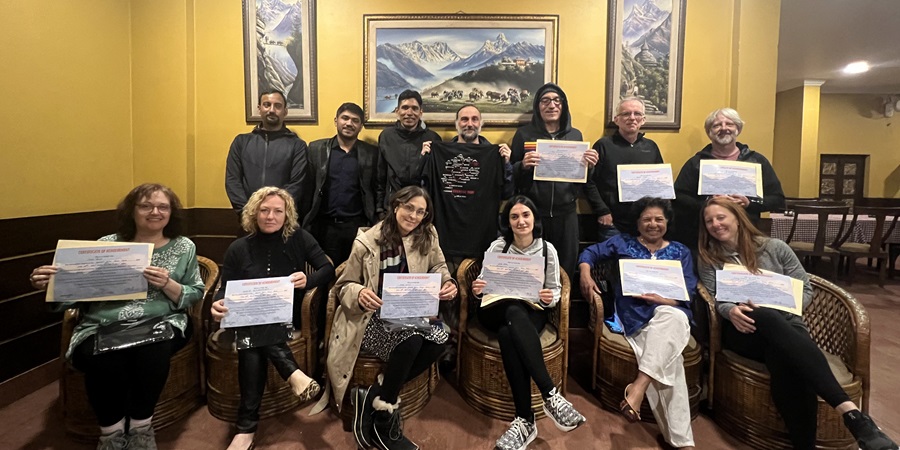
This service is a hallmark of the care and attention we provide to every trekker, whether you’ve completed the Everest Tengboche Trek, the Everest Panorama Trek, or a shorter version of the Everest trek.
Leaving Nepal doesn’t just mean the end of your journey; it’s the beginning of a lifetime of memories from your Everest View Trek. As you prepare for your departure, take a moment to reflect on the incredible experiences you’ve had.
From the scenic flight to Lukla, the trek through vibrant Sherpa villages, to the awe-inspiring views of the Himalayas, each moment has contributed to an adventure that will live on in your heart and mind.
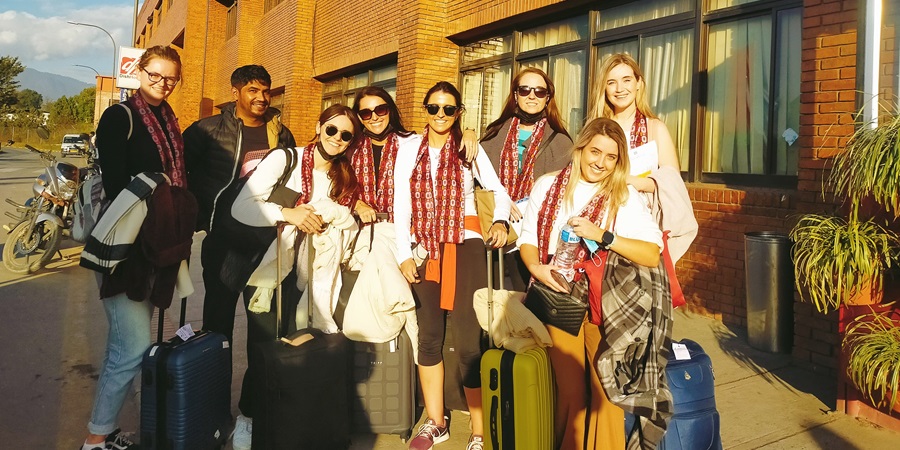
Your journey may have ended, but the stories and memories of your Everest trek are yours to keep and share. The friendships formed, the challenges overcome, and the beauty witnessed along the trails of the Everest region will continue to inspire and remind you of the extraordinary world within the mountains of Nepal.
In summary, as we escort you to the airport for your return journey, we bid you farewell, but not goodbye.
Whether you embark on the Everest Tengboche Trek, the Everest Panorama Trek, or a shorter Everest trek, we hope this adventure leaves you with a sense of accomplishment, joy, and an enduring connection to Nepal.
Until next time, keep the spirit of the Everest View Trek alive in your adventures.
Added Insights
Inclusions for Your Everest View Trek
What's Included?
- Kathmandu Hotels: Unwind in comfort with a 3-night stay in handpicked hotels in Kathmandu, ensuring a relaxing start and end to your Everest panorama trek.
- Airport Transfers: We provide four-time airport pick-up and drop-off, ensuring hassle-free transportation in Kathmandu for your Everest view trekking experience.
- Domestic Flights: Included are round-trip flight tickets from Kathmandu to Lukla, integral to the Everest short trek, covering all airport taxes and ensuring a smooth transition to the trek’s starting point.
- Teahouse Accommodation: Immerse in the local ambiance with traditional tea house stays, offering a genuine Everest region experience. Twin-sharing rooms and the option for room upgrades cater to your comfort needs.
- Daily Meals: Our Everest View Trek package includes three daily meals to energize you for each day’s adventure, crafted to suit the needs of high-altitude trekking.
- Professional Trek Leaders: With government-licensed, English-speaking trek leaders, your journey is guided by experts, ensuring a safe and enlightening Everest sunrise trek.
- Assistant Guides and Porters: For larger groups, we provide additional assistant guides and porters, essential for a comfortable Everest Tengboche trek experience.
- Park Entrance and Local Permits: We cover the Sagarmatha National Park entrance fee and Khumbu Pasang Lhamu Rural Municipality entry permit fees, crucial for your trek.
- Seasonal Fruits, Emergency Assistance, and More: Enjoy nightly seasonal fruits, have peace of mind with our emergency assistance, and celebrate your achievement with a trek completion certificate.
- Support for Guides and Porters, No Hidden Costs: Our package is inclusive of all necessary support for our staff and transparent with all government taxes and fees included.
What's Excluded?
- International Flight Costs: These are not included and must be booked separately by travellers.
- Nepal Entry Visa Fees: Multiple entry visa fees on arrival at Tribhuvan International Airport are not included.
- Excess Baggage Charges: Additional charges will apply if your baggage exceeds the 10 kg per person limit during the trek.
- Food and Accommodation in Kathmandu: Costs incurred in Kathmandu are not included.
- Extra Night Accommodation in Kathmandu: If you arrive early, depart late, or return early from the trek, additional nights in Kathmandu are not covered.
- Personal Spending: Any shopping, snacks, bottled water, hot tea/coffee, cold drinks, hot showers, alcohol, Wi-Fi, telephone calls, battery re-charging fees, extra porters, etc., are not included.
- Travel Insurance: It’s recommended to have travel insurance that covers emergency high-altitude rescue and evacuation, which is not included.
- Tipping: Tips for your guide, assistant guide, and porter are at your discretion and not included.
- Additional Costs Beyond Our Control: Any costs incurred due to unforeseen circumstances like landslides, weather, changes in government policies, strikes, etc., are not included.
- Not Mentioned in Inclusion List: If it’s not on the inclusions list, assume it’s not part of the package.
Essential Information - Everest View Trek
Best Season for Everest View Trek – A Himalayan Delight
Selecting the ideal season for your Everest View Trek adventure can make all the difference. Here, we explore the best seasons for this trek and why they’re the perfect choices.
Spring (March to May) – Nature’s Reawakening
Spring brings the Everest region to life. The landscape bursts with colour as temperatures warm up and the snow melts. Clear skies during mornings provide stunning vistas from Everest View Point.
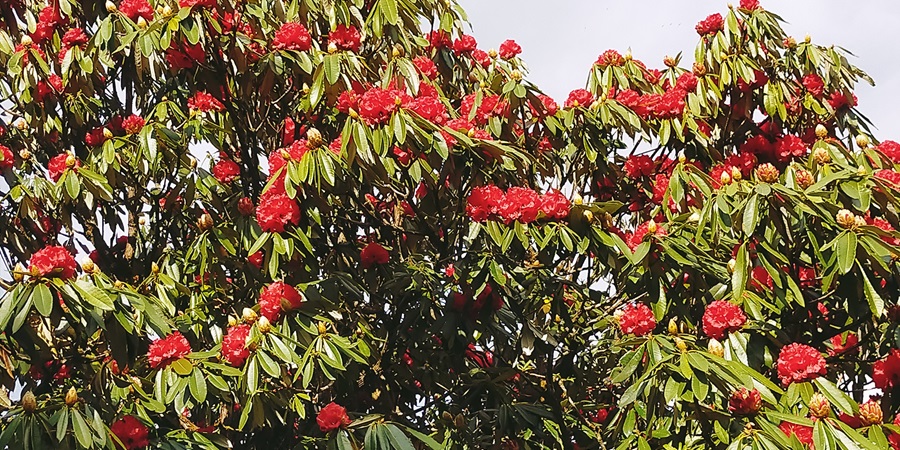
Autumn (September to November) – Peak Perfection
Post-monsoon autumn is the peak season for the Everest View Trek. The monsoon rains clear the air, resulting in unparalleled mountain views. Stable weather and comfortable temperatures make it the ideal time to trek to Everest View Point or explore the panorama trek.
Plan Your Everest View Trek with Season in Mind
When planning your Everest View Trek, consider your trekking goals and the experience you desire. Choosing between spring and autumn ensures you maximize your Himalayan adventure.
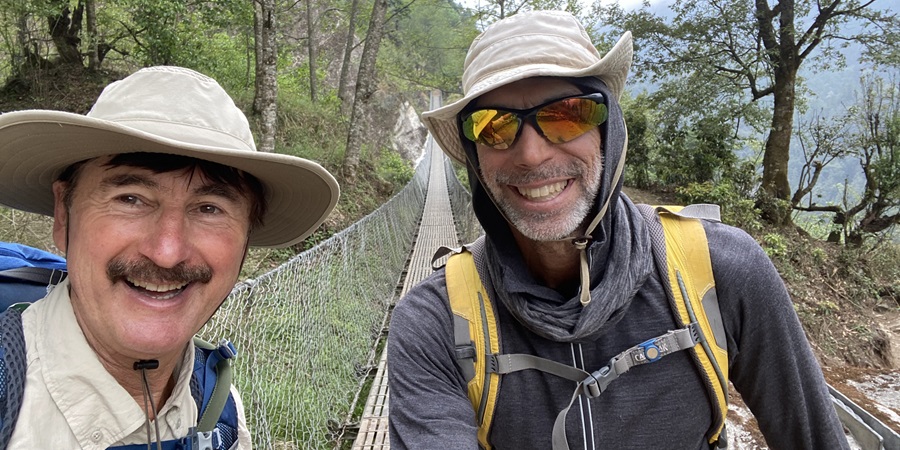
Comprehensive Permit Inclusions for Your Everest View Trek
Embarking on the Everest View Trek with Trek Nepal Himalayas Pvt Ltd means embarking on an adventurous and hassle-free journey. A significant benefit of choosing this trekking package is the inclusion of all necessary permits in the overall cost. This ensures a streamlined preparation process, allowing you to focus solely on the experience. Here’s an overview of the licenses included in your Everest View Trek package:
Sagarmatha National Park Entry Permit: Protecting the Everest Ecosystem
- Purpose: The Sagarmatha National Park Entry Permit is a mandatory requirement for anyone trekking within the boundaries of the Sagarmatha National Park. The revenue generated from this permit is crucial for conservation efforts, aiding in preserving the region’s unique biodiversity and natural beauty.
- The package includes Trek Nepal Himalayas Pvt Ltd, which takes care of obtaining the Sagarmatha National Park Entry Permit for you. The cost of this permit is conveniently contained in your trek package, ensuring that you have authorized access to the park without any administrative hassles.
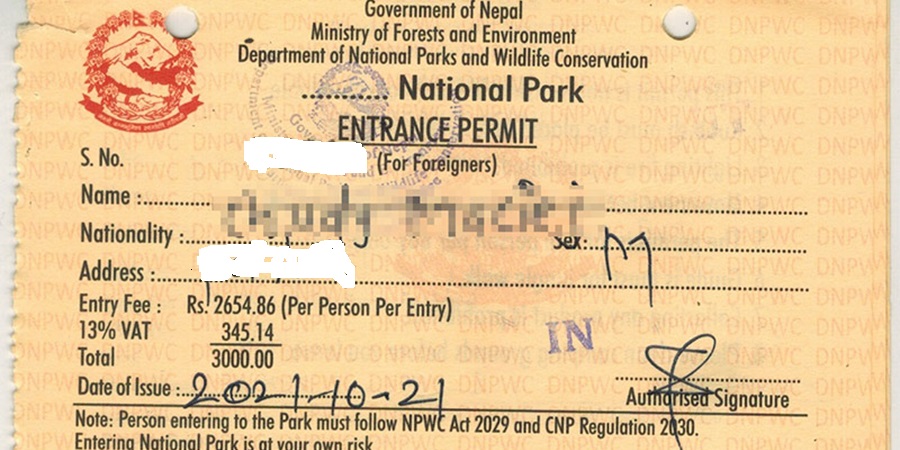
Pasang Lhamu Trek Card: Supporting Local Communities
- Purpose: The Pasang Lhamu Trek Card is required for trekking in the Everest region and is issued by the Pasang Lhamu Rural Municipality. The fund from this permit contributes to local community development, infrastructure projects, and the promotion of responsible and sustainable trekking practices in the region.
- Included in Package: As part of the comprehensive service of Trek Nepal Himalayas Pvt Ltd, the Pasang Lhamu Trek Card is also in your trek package. The company manages the acquisition of this permit, covering the documentation and associated fees, allowing you a smooth entry into the region.
By choosing Trek Nepal Himalayas Pvt Ltd for your Everest View Trek, you are relieved of the burden of managing these essential permits. This inclusion not only simplifies your trek preparation but also contributes to the conservation and development of the Everest region. With these permits, you’re all set to embark on an unforgettable adventure in the heart of the Himalayas.
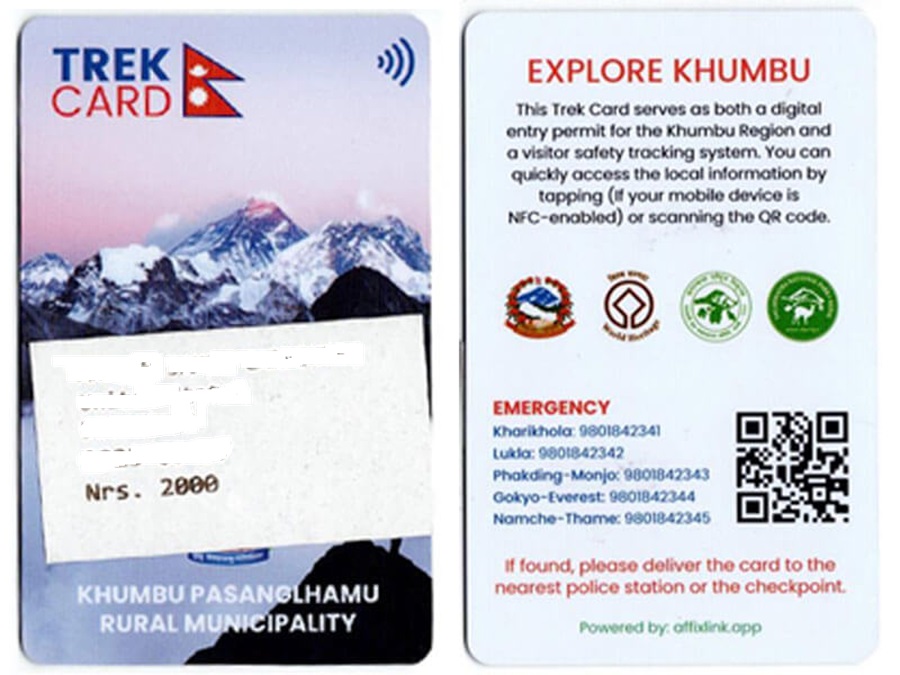
Your Accommodation Choices on the Everest View Trek with Trek Nepal Himalayas Pvt Ltd
The Everest View Trek, managed by Trek Nepal Himalayas Pvt Ltd, promises breathtaking views and a range of accommodation options to enhance your trekking experience. Understanding these options lets you choose what best suits your preferences and needs. Here’s a closer look at the accommodation choices available during your Everest View Trek:
Teahouses: Immersing in Local Ambiance
- What to Expect: The Everest View Trek route teahouses provide simple yet functional rooms, often with shared bathroom facilities. These lodges also offer communal dining spaces where hot meals, predominantly traditional Nepali cuisine, are served.
- Experience: Staying in teahouses is a quintessential part of trekking in the Everest region. They offer a cosy bed, warm meals, and the chance to interact with fellow trekkers and locals. This standard accommodation option is included in your trek package, offering a genuine insight into local life.
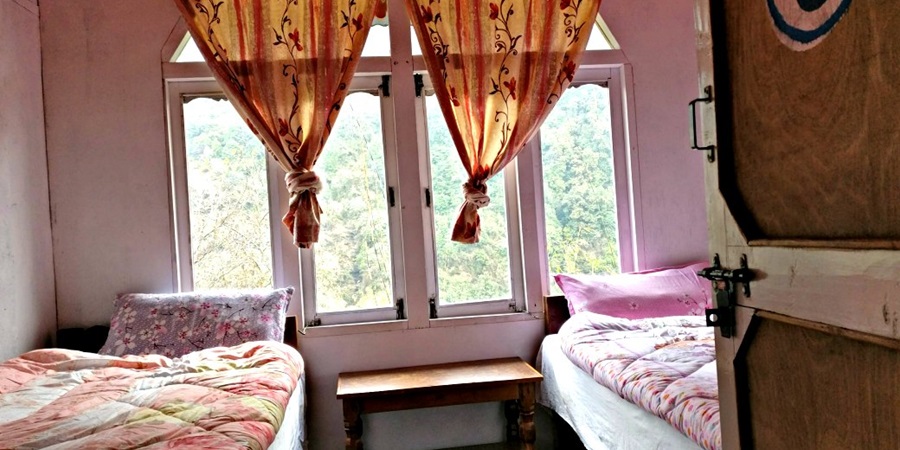
Luxury Lodges: Comfort in the Mountains (Available on Request)
- What to Expect: If you prefer a more comfortable stay, luxury lodges are available on request at an additional cost. These lodges feature spacious rooms with plush bedding, en-suite facilities, and sometimes even heated floors. They also offer various dining options, catering to local and international tastes.
- Experience: Luxury lodges provide an opulent retreat after a day of trekking, ensuring a high level of comfort and relaxation amidst the mountain landscape.
Homestays: A Cultural Deep-Dive
- What to Expect: Homestays offer basic but clean accommodation, with meals prepared by your host family. This option gives you a taste of the authentic local Sherpa culture.
- Experience: Choosing a homestay immerses you in the daily life and traditions of the Sherpa community, adding a deep cultural dimension to your trek. This option is included in the standard package.
Camping: Wilderness Under the Stars (Available on Request)
- What to Expect: For a more adventurous experience, opt for tented accommodation with basic toilet and cooking facilities. Camping allows you to sleep in remote locations under the stars, surrounded by nature.
- Experience: This option is ideal for those seeking a closer connection with nature and a more rugged trekking experience. It is available on request and comes at an additional cost.
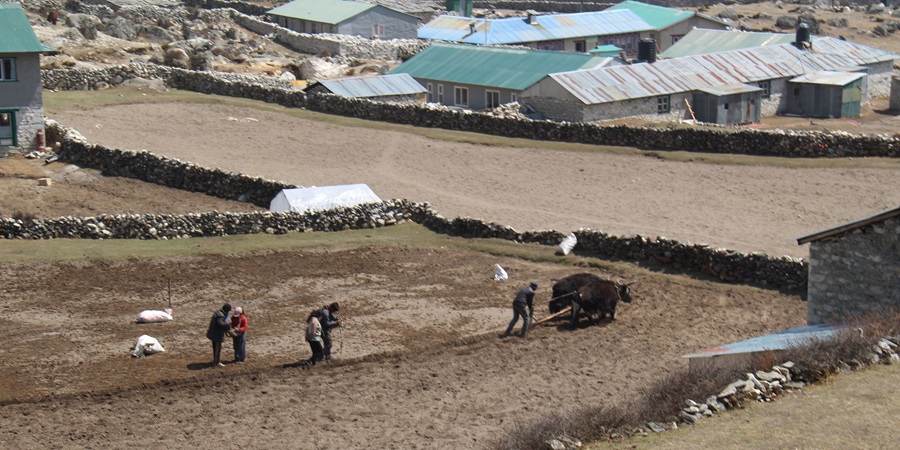
Each of these accommodation options on the Everest View Trek offers a unique way to experience the majesty of the Himalayas. Whether you prefer the rustic charm of teahouses, the cultural immersion of homestays, the luxury of upscale lodges, or the adventure of camping, Trek Nepal Himalayas Pvt Ltd ensures your stay is as memorable as the trek itself.
Beverage Options and Staying Hydrated on the Everest View Trek
When embarking on the Everest View Trek, knowing your beverage options and the essentials of staying hydrated in the high-altitude Himalayan environment is important. Here’s a guide to what you can expect in terms of drinks and hydration strategies during your trek:
Beverage Choices on the Trek
- Tea: Embracing the local culture, Nepal is a nation where tea is a staple. You’ll find a variety of teas on the Everest View Trek, from traditional milk tea to herbal infusions like mint or lemon. Enjoying a cup of tea not only helps in acclimatization but also offers a taste of local customs.
- Coffee: While coffee is available at most teahouses and lodges along the trek, it is often instant coffee, especially in more remote areas. If you’re a coffee enthusiast, prepare for a different coffee experience than you might be used to.
- Hot Lemon: A popular drink in the mountains, hot lemon is made from fresh lemon juice and hot water, often accompanied by honey or ginger. It’s a refreshing beverage that’s particularly soothing in cold weather.
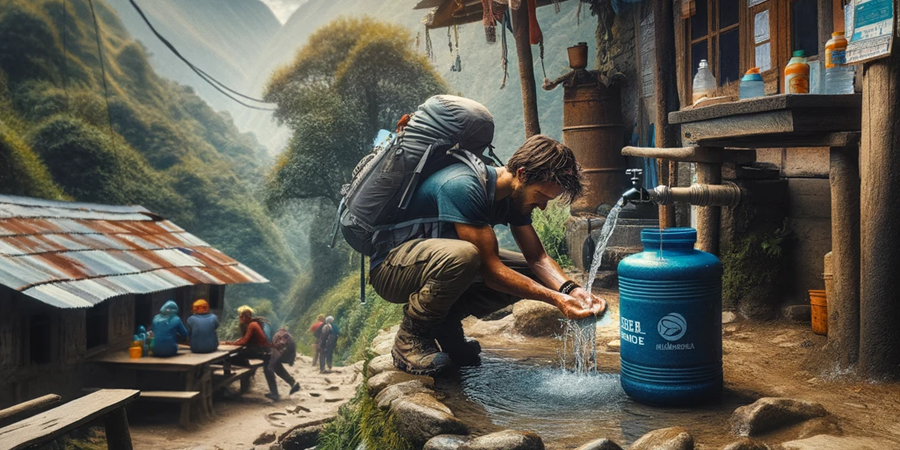
Hydration Strategies During the Everest View Trek
Staying hydrated is crucial, especially at high altitudes with a higher risk of dehydration. Here are the options for drinking water:
- Tap Water (Caution Advised): Tap water along the trekking routes is generally unsafe for drinking. Consuming untreated tap water exposes you to the risk of waterborne diseases.
- Boiled Water: A reliable and popular choice, most teahouses and lodges offer boiled water for a fee. Ensure the water has been cooked for at least one minute to make it safe for consumption.
- Bottled Water: While convenient, bottled water contributes to the growing problem of plastic waste in the Himalayas. If you choose bottled water, responsibly return empty bottles to lower regions for proper disposal.
- Water Purification Tablets: These are a lightweight and effective method to purify water. They’re easy to use but require about 30 minutes before the water is safe to drink.
- Water Filtration Systems: Advanced options like portable water filters or UV sterilizers are effective and environmentally friendly. They are a worthwhile investment for trekkers who frequently embark on such adventures.
By understanding these beverage and hydration options, you can ensure a more enjoyable and healthy experience on your Everest View Trek. Whether sipping on a hot cup of tea or providing your water is safe, these essentials are critical to a successful trek in the Himalayas.
Enjoying Hot Showers on Your Everest View Trek: A Blend of Comfort and Sustainability
The Everest View Trek offers spectacular views and various options for comfort, including the luxury of hot showers in different types of accommodations. Whether you choose upscale lodges, traditional teahouses, or custom camping experiences, you can find ways to refresh yourself after trekking. Here’s an overview of hot shower facilities during your trek:
Hot Showers in Luxury Lodges
- Upscale Comfort: By choosing a package with luxury lodges on your Everest View Trek, you can expect amenities akin to a high-end hotel. This includes the comfort of a hot shower, allowing you to relax and rejuvenate in style after trekking.
- Amenities: These lodges are equipped with modern facilities, ensuring your need for a warm, comforting shower is well-handled.
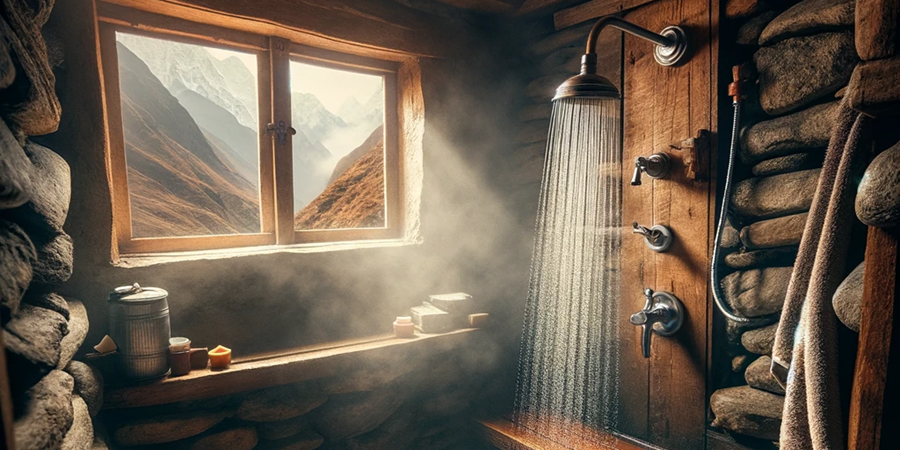
Teahouse Hot Showers
- Availability: While staying in teahouses, a quintessential part of the Everest View Trek, you’ll often have access to hot showers. These facilities, either solar or gas-powered, offer essential comfort.
- Experience: A hot shower in a teahouse is more than just a bath; it’s an opportunity to unwind and prepare for the adventures that await you the next day.
Custom Camping Experience with Hot Showers
- Exclusivity: For a more personalized trekking experience, Trek Nepal Himalayas Pvt Ltd can arrange custom camping setups. They can provide hot shower facilities at your campsite upon request and for an additional cost.
- Convenience: This service ensures you don’t miss out on the essential luxuries, even while embracing the wilderness under the stars.
Eco-friendly Hot Showers
- Sustainable Options: In line with sustainable trekking practices, some teahouses and campsites on the Everest View Trek offer solar-powered hot showers. This option allows you to enjoy the comfort of a hot shower while minimizing your environmental impact.
- Conscious Choices: Opting for eco-friendly showers is a step towards responsible trekking, aligning your adventure with preserving the Everest region’s delicate ecosystem.
Hot showers during the Everest View Trek offer comfort and sustainability, whether in a luxury lodge, a cosy teahouse, a bespoke campsite, or an eco-friendly setup. This small luxury can significantly enhance your trekking experience, providing the perfect balance of adventure and comfort in the heart of the Himalayas.
Electricity and Connectivity During Your Everest View Trek
Embarking on the Everest View Trek means stepping into a world of natural wonders, and thanks to modern amenities, you can stay connected and powered up throughout your journey. Here’s what you need to know about electricity and WiFi availability during the trek:
Reliable Electricity Supply
- Power Accessibility: Whether in luxury lodges or local teahouses, you will generally find electricity available to charge your essential gadgets and camera batteries. This accessibility ensures you can keep your devices charged, capturing every breathtaking moment of your trek.
- Charging Facilities: Most accommodations along the Everest View Trek route provide power outlets, though there may be a nominal fee for charging devices.
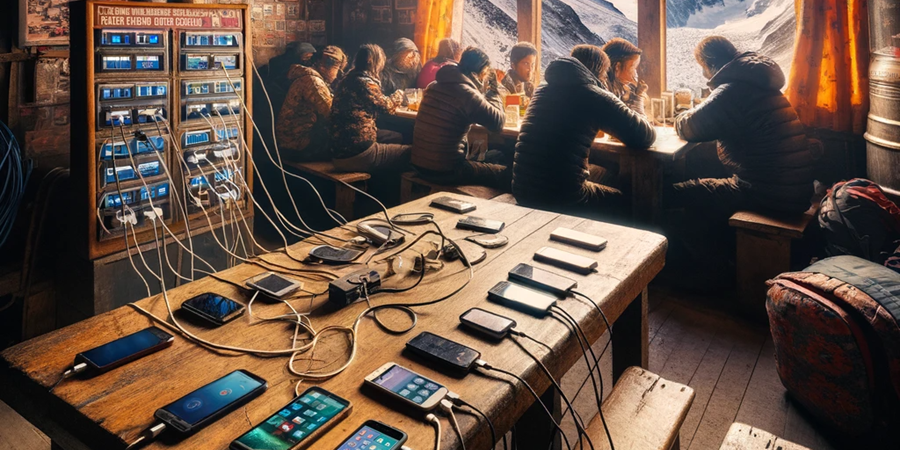
WiFi Connectivity on the Trek
- Availability: Stay connected even as you trek through the Himalayas. WiFi services are widely available at various points along the Everest View Trek, allowing you to share your journey with friends and family or stay updated with the outside world.
- Quality of Service: While WiFi is available, the connection quality can vary depending on location and weather conditions. In more remote areas, connectivity may be slower or intermittent.
Luxury Lodges for Enhanced Connectivity
- Premium Experience: Opting for a stay in luxury lodges on your Everest View Trek package offers you the advantage of high-speed WiFi and reliable electricity. These lodges cater to trekkers seeking both comfort and connectivity.
- Facilities: Luxury lodges provide state-of-the-art connectivity and comfortable accommodation, ensuring a seamless connection throughout your stay.
Mobile Network Connectivity
- NTC Mobile Network: For those relying on mobile connectivity, Nepal Telecom (NTC) provides robust network coverage along most routes of the Everest View Trek. This network allows consistent mobile phone usage, including calls, texts, and data services.
- Coverage: While NTC’s network is reliable in the Everest region, there might be areas with limited or no connectivity, especially at higher altitudes or in more remote locations.
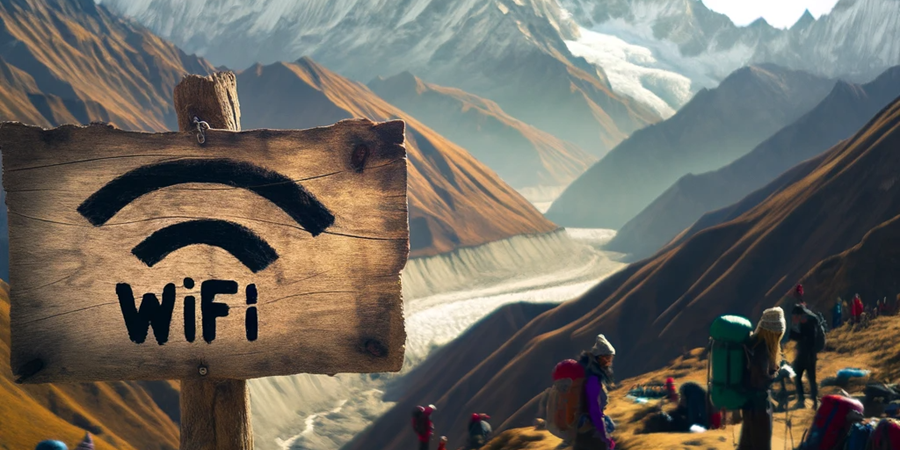
On the Everest View Trek, the combination of electricity availability and WiFi connectivity ensures you can stay connected and keep your devices running smoothly. Whether you’re sharing live updates of your journey, capturing stunning photos, or simply staying in touch with loved ones, these modern conveniences enhance your trekking experience in the heart of the majestic Himalayas.
The Importance of Travel Insurance for Your Everest View Trek
Trekking on the Everest View Trek with Trek Nepal Himalayas Pvt Ltd is an unforgettable adventure, but it also requires careful preparation, especially regarding travel insurance. Understanding the types of coverage necessary for such a high-altitude trek is crucial for your safety and peace of mind. Here’s why travel insurance is essential for the Everest View Trek and what types should be considered:
Comprehensive Coverage for the Everest View Trek
- Wide-Ranging Protection: Select a travel insurance policy that offers comprehensive coverage. This should include emergency evacuation, medical treatment for injuries or illnesses, trip cancellations or delays, and coverage for lost or stolen belongings.
- Specific Needs of High-Altitude Trekking: The unique challenges of trekking in the Himalayas necessitate specialized insurance coverage that caters to the particular conditions of the region.
Emergency Evacuation Coverage
- Helicopter Rescue: Emergency helicopter evacuations are not uncommon due to the Everest region’s remote nature and challenging terrain. Ensuring that your travel insurance policy includes coverage for such evacuations is vital, particularly at the altitudes reached during the Everest View Trek.
- Cost Coverage: Helicopter rescues can be costly, and having insurance that covers these expenses is essential.
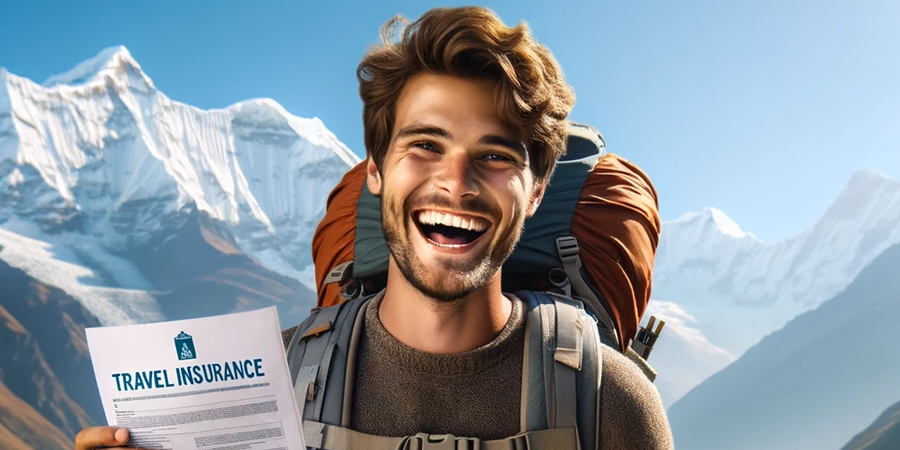
Medical Expenses and Hospitalization
- Health Risks at High Altitudes: Trekking at high altitudes carries inherent health risks, such as altitude sickness, which can require immediate medical attention.
- Hospital and Treatment Costs: Ensure that your insurance covers hospitalization and medical expenses in Nepal. This coverage will provide financial support if you need medical care during the trek.
Protection for Lost or Stolen Belongings
- Safeguard Your Gear: The rugged nature of the Everest View Trek means there’s a risk of losing or damaging personal belongings or having them stolen.
- Peace of Mind: Insurance that covers personal belongings allows you to trek with peace of mind, knowing you’re protected against these losses.
Securing the right travel insurance for your Everest View Trek is not just a recommendation; it’s a necessity. With the appropriate coverage, you can embark on this incredible journey knowing that you’re prepared for various contingencies, allowing you to fully enjoy the awe-inspiring experience of trekking in the Himalayas.
Money Management on the Everest View Trek: A Practical Guide
The Everest View Trek requires physical and mental preparation and careful financial planning. Knowing how to manage your funds effectively is crucial for a hassle-free experience. Here’s a guide to help you navigate money management for your trek:
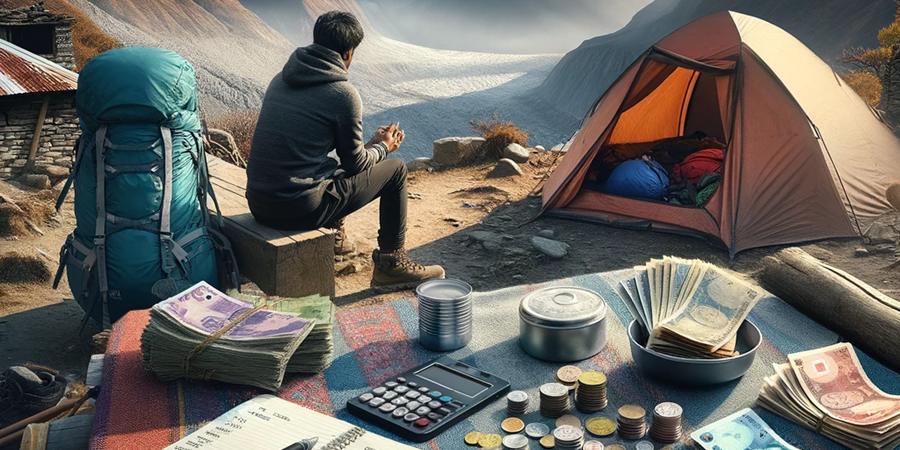
Financial Preparations in Kathmandu
- Access to Financial Services: Kathmandu, the starting point for most trekkers, offers many financial services. Utilize the city’s multiple ATMs, banks, and currency exchange outlets to organize your finances before heading to the mountains.
- Withdrawing Cash: You should remove enough cash in Kathmandu for the trek. While limited financial services are available in Namche Bazaar, Kathmandu offers better reliability and rates.
ATM and Banking Services in Namche Bazaar
- Last Reliable ATMs on the Trek: Namche Bazaar hosts the last reliable ATMs on the Everest View Trek. Remember that these ATMs might charge higher transaction fees and offer less favourable exchange rates than those in Kathmandu.
- Limited Banking Services: While Namche Bazaar does provide some banking services, they are limited. It’s best to complete significant financial transactions in Kathmandu.
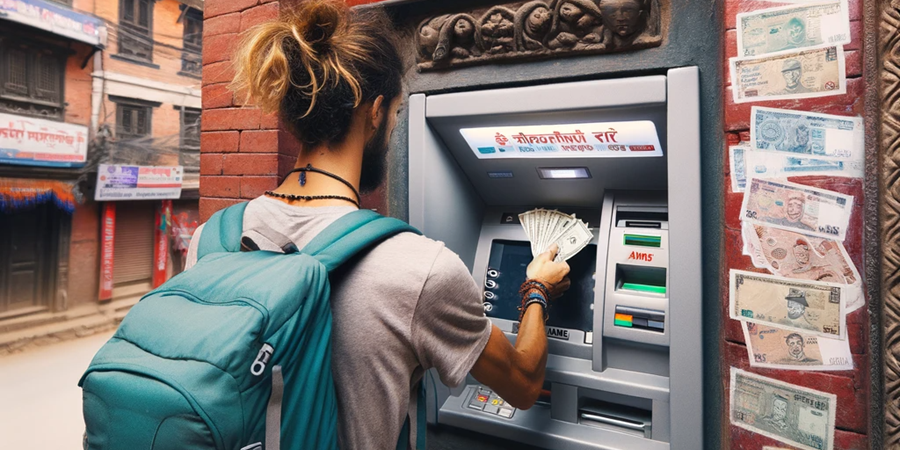
Cash Versus Card on the Trek
- The Prevalence of Cash Transactions: Cash is the primary mode of transaction throughout the Everest View Trek, especially in smaller villages and teahouses.
- Limited Card Services: While card services are available in Namche Bazaar and some larger settlements, their availability is not widespread. It’s prudent to rely primarily on cash.
The Importance of Carrying Cash
- Diversified Financial Security: Carrying a mix of cash and cards is wise for diversified financial security during your trek. This ensures you’re prepared for various spending scenarios.
Understanding Exchange Rates and Local Currency
- Familiarize yourself with exchange rates: Before travelling
 , familiarize yourself with the current rates. This knowledge will assist in making informed financial decisions.
, familiarize yourself with the current rates. This knowledge will assist in making informed financial decisions. - Carrying Nepalese Rupees: Nepalese Rupees, particularly in smaller denominations, are essential for day-to-day transactions on the trek. Ensure you have enough cash to cover primary expenses and emergencies.
Money management is critical to a smooth and enjoyable Everest View Trek experience. By organizing your finances in Kathmandu, understanding the availability of financial services along the trek, and carrying the appropriate mix of cash and cards, you can focus more on the breathtaking views and less on monetary concerns.
10 Frequently Asked Questions About Everest View Trek
The best times to embark on an Everest View Trek are during the pre-monsoon season (March to May) and post-monsoon season (September to November). During these times, the weather is generally stable, and the views are clear.
The Everest View Trek is considered to be moderate in terms of difficulty. It is less challenging than the Everest Base Camp Trek but still requires good physical fitness.
Standard tea houses are commonly used for accommodation. However, luxury lodges and camping options are available at an additional cost upon request.
It’s important to drink only purified or boiled water. Buying bottled water is also an option, though less eco-friendly.
Wi-Fi and electricity are generally available throughout the trek. NTC mobile network coverage is also excellent along the route.
Getting a comprehensive travel insurance policy that covers emergency evacuation, medical expenses, and trip cancellations is highly recommended.
Though ATMs are available in Kathmandu and Namche Bazaar, carrying sufficient cash in Nepalese Rupees for the entire journey is advisable.
Hot showers are available in many tea houses and lodges, usually at an extra cost.
The trek offers a variety of food options ranging from traditional Nepalese cuisine to more Western dishes like pasta and pizza.
You will need a TIMS (Trekkers’ Information Management System) card and a Sagarmatha National Park Entry Permit. Both can be acquired in Kathmandu before you begin your trek.
Reviews on Everest View Trek
Be first to post a review in this trip.


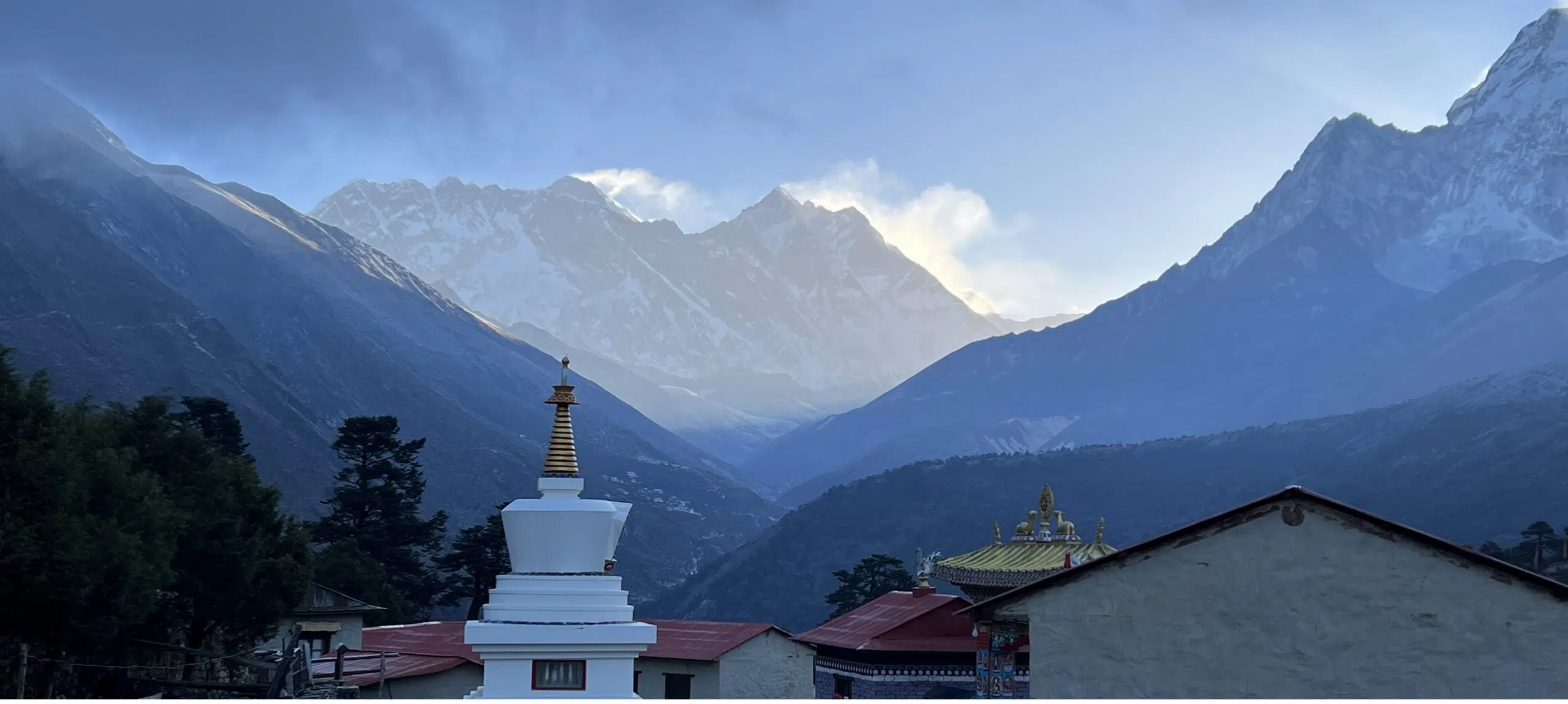
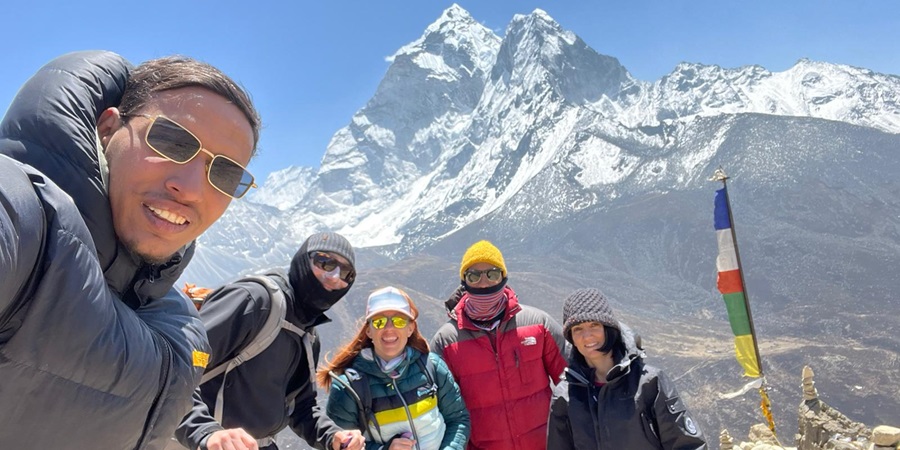 , familiarize yourself with the current rates. This knowledge will assist in making informed financial decisions.
, familiarize yourself with the current rates. This knowledge will assist in making informed financial decisions.
